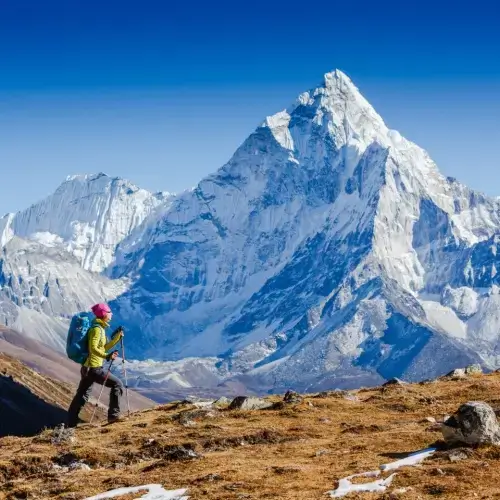Home / Compare Travel Insurance / Travel insurance for hik…

Key takeaways
- Adventure sports cover can be part of some comprehensive policies or available as an add-on. It can help cover costs such as medical expenses and travel cancellations that result from adventure activities.
- Hiking, trekking and mountaineering are all different activities, which may be included in standard cover or need an adventure sports add-on for an additional premium.
- Your policy’s Product Disclosure Statement (PDS) will outline the details of your cover, including inclusions, exclusions, limits, sub-limits and more.
Expert tips for finding travel insurance for hiking, trekking and mountaineering
Before taking your next adventure and making lifelong memories, Compare the Market’s Executive General Manager of General Insurance, Adrian Taylor has some tips for comparing travel insurance.

Compare adventure sports benefits between policies and insurers
Regarding policies, it’s important to know that the inclusions of adventure travel insurance cover can vary greatly between insurers. Adventure sports cover is sometimes provided automatically, while other times, an extra premium will be charged for extra cover or an adventure sport add-on. The good news is that if you know the activity you need to be covered for, such as hiking, you can check the Product Disclosure Statement (PDS) to see whether you’ll get the necessary level of cover.
Don’t forget the rest of the trip
Even the most action-packed trip needs cover for the necessities, such as flight cancellations, medical costs and lost luggage. While the hike or trek might be your trip’s highlight, ensure your policy includes adequate cover for medical expenses, cancellation fees and luggage. Also, consider cover for rental vehicle excess, cruises or for other parts of your trip.
Choose licensed operators for all adventure sports
There are many benefits to using a licensed operator whenever possible for local or overseas adventure activities. Not only are they experienced and know how to keep you safe, but from an insurance perspective, many insurers won’t cover you if you use an unlicensed operator.
Why take out travel insurance for hiking, trekking and mountaineering?
 Whether you want to experience the Inca Trail, Mount Kilimanjaro, the Everest Base Camp or somewhere closer to home, there are plenty of hiking opportunities worldwide. Finding travel insurance that covers your hiking, trekking, or mountaineering allows you to embrace your adventurous side with the peace of mind of having a safety net should something go wrong. Adventure travel can provide the following benefits:
Whether you want to experience the Inca Trail, Mount Kilimanjaro, the Everest Base Camp or somewhere closer to home, there are plenty of hiking opportunities worldwide. Finding travel insurance that covers your hiking, trekking, or mountaineering allows you to embrace your adventurous side with the peace of mind of having a safety net should something go wrong. Adventure travel can provide the following benefits:
- Medical assistance if you’re injured as a result of a covered activity
- Cancellation cover if you need to cancel due to an illness or injury
- Cover for lost or damaged personal effects/belongings.
What’s the difference between hiking, trekking and mountaineering?
Knowing the difference between these three activities isn’t just helpful in understanding what you’re signing up for; it can also help you understand your insurance coverage. As always, be sure to read the policy’s PDS carefully or contact a travel insurance expert.
Hiking
Hiking is usually defined as long, energetic walks in natural environments. Hikes often come in a range of difficulties from easy to moderate and are typically done on well-beaten tracks. Depending on the hike, it may be a single or multi-day activity.
Trekking
Trekking is a more challenging version of hiking and is often done off the beaten path. It can last for days or weeks and cover multiple terrains. Trekkers may need more specialised gear than hikers, including trekking poles, backpacks and camping equipment. Due to the more elaborate nature of these trips, treks are, on average, more expensive than hikes.
Mountaineering
Mountaineering usually requires you to use equipment like ropes, crampons and similar specialist equipment. While mountaineering will have elements of hiking and trekking, it also involves climbing and other more physically demanding activities. Due to this and the higher risk, not all insurance companies will offer travel insurance for mountaineering, or will offer specialist cover instead for a higher premium.
Insurance cover for hiking, trekking or mountaineering
Medical cover
 Adventure activities can be an experience you’ll remember forever, but keep in mind that there are risks involved.
Adventure activities can be an experience you’ll remember forever, but keep in mind that there are risks involved.
Your private health insurance and Medicare won’t cover you while you travel overseas, so any medical costs you incur while travelling will need to be paid out of pocket. However, travel insurance can help cover these medical costs and provide peace of mind should a medical emergency occur. Medical cover will usually include:
- Medical treatment for illness and injury
- Medical evacuation and repatriation (including helicopter rescue if deemed necessary)
- 24/7 emergency assistance team.
Trip cancellations, disruptions and delays
When travelling, there’s always a chance that something outside your control will disrupt your travel plans. This could be bad weather leading to your flight being cancelled or even you falling ill and being unable to go on your trip. Travel insurance with cancellation cover can compensate you for pre-paid and non-refundable expenses like accommodation, activities, costs for hired equipment and transport.
Some circumstances that could lead to trip cancellations or interruptions that are generally covered include:
- Illness, injury or death of you or your travel companion
- Family emergencies, such as a family member becoming ill
- A natural disaster or significant weather event occurring in your intended location
- The government issuing a ‘do not travel’ warning for your intended destination (after you’ve purchased cover).
You’ll need to provide documentation that supports your reason for cancelling, such as a medical certificate. Cancellation cover is usually available in both single-trip and annual multi-trip policies.
What will my cover exclude?
The inclusions and exclusions of a travel insurance policy can vary greatly depending on the insurer. Some of the more common exclusions when it comes to hiking, trekking and mountaineering include:
- Altitude limits: Insurers will impose a limit as to how high you can go and still remain covered. Usually, the limit is around 3,000-3,500 metres, though this can vary depending on the policy. If you’re planning a high-altitude trek, your travel insurance for trekking may not cover it or you may need to purchase additional cover.
- Extreme mountaineering: Mountaineering that requires guides, ropes, rock climbing equipment or oxygen isn’t covered by most standard adventure travel. If you’re planning on mountaineering, you’ll need to speak to an insurer who specialises in this type of cover.
- Certain locations: Your insurance may not cover some locations for various reasons (e.g. countries with a ‘do not travel’ warning).
General exclusions for adventure travel insurance
All policies will have parameters, limits and exclusions specified in the PDS. These details will vary between insurance providers; however, below are some of the most common exclusions found in adventure cover:
- Failure to use proper safety equipment: Not using the correct safety gear could lead to your claim being rejected if something went wrong.
- Intoxication: Being under the influence of drugs or alcohol when you’re injured could void your insurance claim, even if the injury wasn’t your fault.
- Pre-existing medical conditions: Your current health status could limit what your insurer will cover you for, especially if you don’t disclose this during your application. It’s important to be upfront and to check whether you need to take a medical assessment to get cover, especially for an intense activity like trekking or mountaineering.
Meet our travel insurance expert, Adrian Taylor
As a General Insurance expert with over 13 years’ experience in financial services, Adrian Taylor believes in educating customers about the importance of travel insurance so that anyone can kick back and make the most of their time away from home. While no one wants a disrupted holiday, a suitable travel insurance policy can provide a financial safety net for yourself, your belongings and your trip in case things go wrong.


